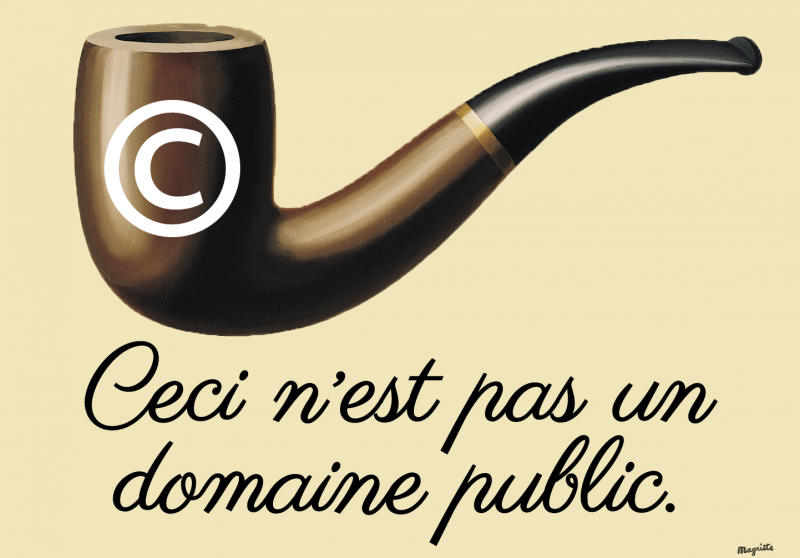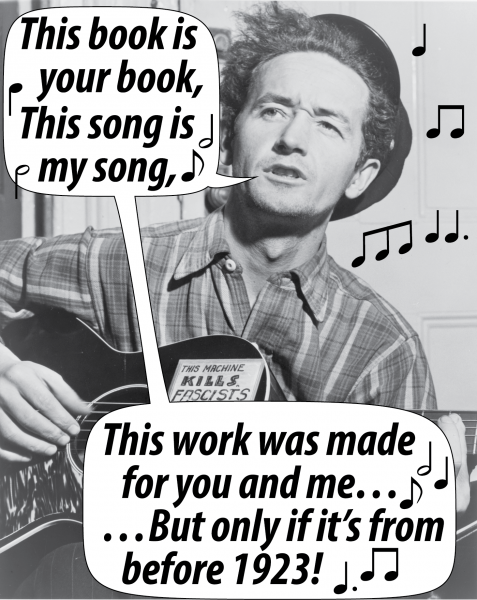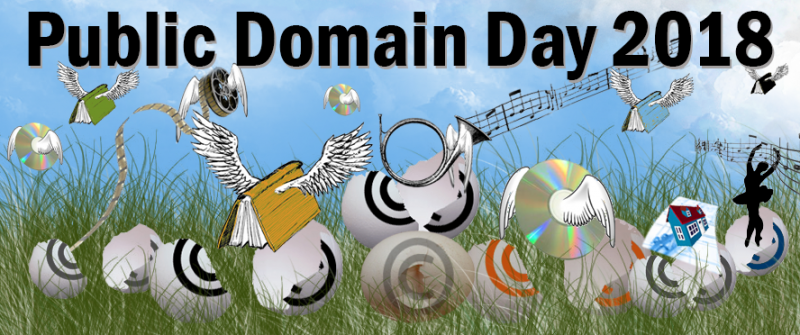A Welcome to Public Domain Day by Duke's Law School; What is Entering Public Domain in the US? Not a Single Published Work
Public Domain Day: January 1, 2018
 Public Domain Day is January 1st of every year. If you live in Canada or New Zealand, January 1st 2018 would be the day when the works of René Magritte, Langston Hughes, Dorothy Parker, Jean Toomer, Edward Hopper, and Alice B. Toklas enter the public domain.1 So would the musical compositions of John Coltrane, Billy Strayhorn, Paul Whiteman, Otis Redding, and Woody Guthrie. Canadians can now add a wealth of books, poems, paintings, and musical works by these authors to online archives, without asking permission or violating the law. And in Europe, the works of Hugh Lofting (the Doctor DoLittle books), William Moulton Marston (creator of Wonder Woman!), and Emma Orczy (the Scarlet Pimpernel series) will emerge into the public domain, where anyone can use them in their own books or movies. (You can find a great celebration of some of these authors here.)
Public Domain Day is January 1st of every year. If you live in Canada or New Zealand, January 1st 2018 would be the day when the works of René Magritte, Langston Hughes, Dorothy Parker, Jean Toomer, Edward Hopper, and Alice B. Toklas enter the public domain.1 So would the musical compositions of John Coltrane, Billy Strayhorn, Paul Whiteman, Otis Redding, and Woody Guthrie. Canadians can now add a wealth of books, poems, paintings, and musical works by these authors to online archives, without asking permission or violating the law. And in Europe, the works of Hugh Lofting (the Doctor DoLittle books), William Moulton Marston (creator of Wonder Woman!), and Emma Orczy (the Scarlet Pimpernel series) will emerge into the public domain, where anyone can use them in their own books or movies. (You can find a great celebration of some of these authors here.)

Is "This Land Is Your Land" in the public domain? It's complicated, and there's a pending lawsuit on the subject—you can read more about it here.
What is entering the public domain in the United States? Not a single published work. Once again, no published works are entering our public domain this year.2 (Happily, works published in 1923 will finally begin to enter our public domain next year.) The only works that are clearly in the US public domain now are those published before 1923. But what about works published after that date? Does that mean that they’re still under copyright? Well, maybe. Citizens of the United States have to live with a frustrating lack of clarity about what older works they can use. Did the author comply with registration or renewal requirements when those were mandatory?3 The records are fragmentary and confused, the copyright holders hard to find. Perhaps some post-1923 works by the authors above are in the public domain. Perhaps they are still copyrighted. We have to live in a fog of uncertainty, uncertainty that benefits no one. By contrast, in Canada and the EU, the public will know on January 1 that all works by these authors are in the public domain.
When the first copyright law was written in the United States, copyright lasted 14 years, renewable for another 14 years if the author wished. Jefferson or Madison could look at the books written by their contemporaries and confidently expect them to be in the public domain within a decade or two. Now? In the United States, as in much of the world, copyright lasts for the author’s lifetime, plus another 70 years. You might think, therefore, that works whose authors died in 1947 would be freely available on January 1, 2018. Sadly, no. When Congress changed the law, it applied the term extension retrospectively to existing works, and gave all in-copyright works published between 1923 and 1977 a term of 95 years. The result? None of those works will enter the public domain until 2019, and works from 1961, whose arrival we might otherwise be expecting January 1, 2018, will not enter the public domain until 2057. In addition to lengthening the term, Congress also changed the law so that every creative work is automatically copyrighted, even if the author does nothing.
What do these laws mean to you? As you can read in our analysis here, they impose great (and in many cases unnecessary) costs on creativity, on libraries and archives, on education and on scholarship. More broadly, they impose costs on our collective culture. We have little reason to celebrate on Public Domain Day because our public domain has been shrinking, not growing.
Pages: 1 · 2
More Articles
- GAO Report, Older Households: Comparison of Income, Wealth, and Survival in the United States with Selected Countries
- On Earth Day Find Your 'Local' Waterkeeper Organization; Biden's National Climate Task Force
- Diane Girard Writes: Survival Against the Odds; The Hardy Charm of The Independent Book Store
- WWII, People's War, An Archive of of World War II Memories, Written by the Public, Gathered by the BBC: Women's Volunteer Groups
- GAO: COVID-19 Complicates Already Challenged FDA Foreign Inspection Program; It Could Be 2 to 3 Years Before New Staff Are Experienced Enough To Conduct Foreign Inspection
- GAO** Reports: Electronic Cigarettes - US Imports and the Value of US E-cigarette Imports was $2.4 billion; CDC and FDA Campaigns
- On the Buses with Older Warrior Women
- Prime Minister Jacinda Ardern at the National Remembrance Service in NZ: 'Let us be the nation we believe ourselves to be'
- Updated - Winner of the Nobel Prize for Physics: Donna Strickland, First Woman in 55 Years to Receive a Physics Prize: A Laser Jock
- GAO: Better Guidance and Information Could Help Plan Participants at Home and Abroad Manage Their Retirement Savings







